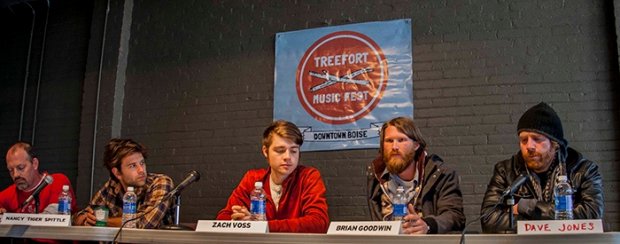 Image via Wikimedia Commons
Image via Wikimedia Commons
Being blessed with enough natural talent to fulfill your aspirations as a professional musician is an extremely fortunate opportunity. Not everyone has the chance to live out his or her dream of making music as a career. So when artists come to that first realization of, "Wow, my passion is becoming my nine-to-five life," containing one's excitement about what the future holds is nearly impossible.
As a result, when artists begin to make initial progress in their careers, they tend to be trigger happy as new opportunities are presented to them. Despite this positive, enthusiastic mindset, it's essential for artists to learn to be selective with their decisions and only move forward with ventures that have their big-picture goals in mind. It may be difficult to pass up on certain deals after spending years working to reach a level where offers come your way, but showing restraint will ultimately benefit you and your artistic initiatives in the long run.
As artists rise within their local scene, it's important to never lose that pure feeling of gratefulness for being able to simply create music for a living. But from a business perspective, implementing a strategy of saying yes to everything is bound to stunt your overall growth. Once a larger audience recognizes your talents, promoters will want to start booking you for countless shows, and other artists will send over collaboration ideas every day. While this may be a good problem to have (keep your email inbox organized!), only a handful of these offers will be truly legitimate and advantageous for you to pursue. But when eager artists jump at every opportunity thrown their way, it's inevitable that they'll sell themselves short at one point and agree to responsibilities that end up devaluing their artistic brand/reputation. Knowing when to sign on the dotted line and when to say, "Thanks, but no thanks" is an art form within itself.
Reference this handy mini-checklist to help put your artistic business possibilities in perspective.
Collaborations
Working with other talented artists on your musical wavelength can be a great thing. Exposing yourself to new sounds and a different fanbase can only aid you as a growing musician. However, you'll undoubtedly be asked to work with other artists who are just simply not as good as you. These offers may come from friends or close acquaintances, but you're not in the business of doing favors. It may sound harsh, but with a worldwide audience having the ability to research every collaboration you've ever done, it's vital to ensure that you work with musicians of a similar pedigree and, most importantly, ones who inspire you to be the best you can be.
Performances
Promoters always have show slots to fill, especially in non-major music markets where qualified talent is not in abundance. When you're first starting out as an indie artist, performing at multiple venues and getting comfortable onstage is a wise move. But as time goes on, you'll need to become picky about when and where you choose to perform. Rather than play multiple shows a week, be selective and pick one that will create a distinct buzz for your fans to think, "I need to see them tonight!" And if you're presented with set times that have lesser qualified artists performing after you, don't be afraid to tell a promoter where you deserve to be placed on the bill. Live shows are vital to your income, so don't become that snobbish artist that everyone hates. But when it comes to time to plan out a tour or live performance schedule, only pursue offers from respected platforms that will showcase your talents in the best light.
Building your team
As you come into your own in the indie world, gathering a passionate, trustworthy management team is a must. But despite the need for intelligent and business-savvy people around you, these are relationships that should happen organically. You'll hear promises of, "I can get your video this many views," or "I can get your song this many plays," but those number-driven guarantees are usually a facade. Someone who's able to deceptively maneuver their way around music platforms does not qualify to be your manager, because those methods will only mislead you into thinking that you have more fans than you actually have. Find professionals who are experts in the areas of marketing, social media, PR, and content creation who share your genuine love for music. If you build with them and not every SoundCloud hacker that comes across your newsfeed, you'll reap the rewards in the long run.
[5 Types of Managers You Don't Want Managing Your Band]
If you're mindful of these examples when deciding on business opportunities, your music career will head in the right direction. Be honest and realistic with yourself when evaluating your status within the local music scene. Doing so will help you gauge the aforementioned opportunities with a non-biased viewpoint and should lead you into making smart decisions. The last thing you want as an indie artist is for your career to stay stagnant and not match the rising quality of your music. If you're picky with your opportunities, yet are simultaneously open to working with growing, well-respected artists and movements, you'll experience progress in both areas!
Eric Bernsen is a marketing/public relations professional and music journalist who specializes in the genre of hip-hop. You can find more of his work at HITPmusic.com (where he is an editor/writer) as well as HipHop-N-More.com, where he contributes album reviews. Follow Eric on Twitter @ebernsen.


